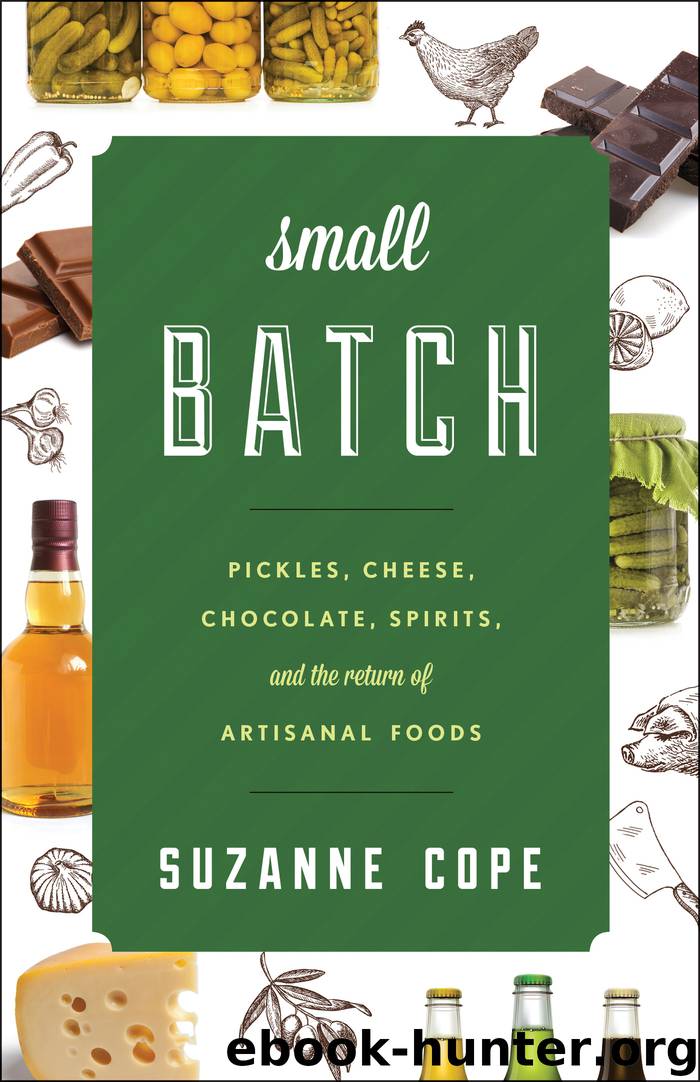Small Batch by Suzanne Cope

Author:Suzanne Cope
Language: eng
Format: epub
Tags: undefined
Publisher: Rowman & Littlefield Publishers
Published: 2012-03-02T16:00:00+00:00
Power of Narrative in Selling
Artisanal Food
While driving over the high Grants Pass from Portland to San Francisco in January, the snow was swirling around the car and I was hoping that there was no black ice on the road. I had just left Portland—actually a small town just outside the city—where I had spent a few hours with cheese maker Liz Alvis. We met at the farmers market where her husband was handing out samples and exchanging cheese for money, and both were greeting most customers by name. A photo of some of the goats from which Liz’s cheese was made was perched next to a tower of her product, emblazoned with the label of Portland Creamery—although the goats reside and the cheese is made in Mollala, Oregon, not far from Portland proper. Between sharing hugs and stories from customers of how well her cheese was received over the holidays, Liz explained that she wanted to tap into the artisanal food scene in Portland, and had a future goal of having the only creamery within city limits, but at the moment was working closely with a herd outside of the city. The connection to both was important for her—and her business identity. The urban identity helped to differentiate her as a newbie among the growing community of Oregon cheese makers, but her interaction with the goats themselves and the farm was also necessary for “authenticity.” Liz was among the younger cheese makers with whom I spoke—in her thirties, fresh-scrubbed. She and her husband made a good-looking, hip, but still country-ish couple. She spoke to the health and happiness of the goats whose milk she works with, the healthfulness of her cheese, and her own cheese-making art—learned from and inspired by her mother, also a cheese maker, residing in Ohio.[35]
The farmers market was cool and damp that morning and Liz, her husband, and I all took turns warming our hands on her portable heater. But Liz’s smile never left her face. This part of her job was as essential as making the cheese. Among these more small-town consumers, she was still convincing some to try chevre for the first time—a very different market than urban Portland, where her product would be easily identifiable as the city’s local fresh goat cheese. She told me how so many had claimed they didn’t like goat cheese. It was clear that the personal touch was integral to growing her business—that these reluctant consumers were convinced as much by the samples as by Liz herself. How could they not indulge the friendly cheese maker for just one taste? And her story was adaptable. For me and her customers in Portland, she plays up her desire to be an artisan in the city, but with a connection to that pastoral vision of goat farming. For her suburban and small-town customers, it is the goats she speaks of and her relationship with the neighboring farm and the land. Both are sincere. Both are necessary marketing strategies.[36]
This importance of narrative is also obvious in how urban versus rural cheese makers define themselves.
Download
This site does not store any files on its server. We only index and link to content provided by other sites. Please contact the content providers to delete copyright contents if any and email us, we'll remove relevant links or contents immediately.
The Brazilian Economy since the Great Financial Crisis of 20072008 by Philip Arestis Carolina Troncoso Baltar & Daniela Magalhães Prates(133696)
International Integration of the Brazilian Economy by Elias C. Grivoyannis(108926)
The Art of Coaching by Elena Aguilar(53178)
Flexible Working by Dale Gemma;(23284)
How to Stop Living Paycheck to Paycheck by Avery Breyer(19713)
The Acquirer's Multiple: How the Billionaire Contrarians of Deep Value Beat the Market by Tobias Carlisle(12308)
Thinking, Fast and Slow by Kahneman Daniel(12248)
The Radium Girls by Kate Moore(12013)
The Art of Thinking Clearly by Rolf Dobelli(10444)
Hit Refresh by Satya Nadella(9121)
The Compound Effect by Darren Hardy(8941)
Tools of Titans by Timothy Ferriss(8363)
Atomic Habits: Tiny Changes, Remarkable Results by James Clear(8319)
Turbulence by E. J. Noyes(8040)
A Court of Wings and Ruin by Sarah J. Maas(7809)
Change Your Questions, Change Your Life by Marilee Adams(7753)
Nudge - Improving Decisions about Health, Wealth, and Happiness by Thaler Sunstein(7689)
How to Be a Bawse: A Guide to Conquering Life by Lilly Singh(7466)
Win Bigly by Scott Adams(7183)
